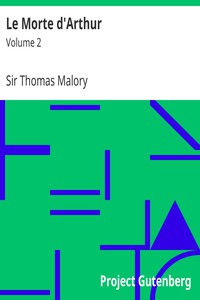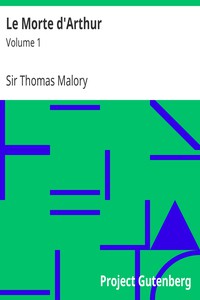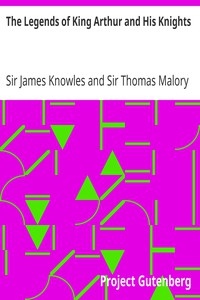Le Morte d'Arthur: Volume 2, Sir Thomas Malory [best pdf reader for ebooks .TXT] 📗

- Author: Sir Thomas Malory
Book online «Le Morte d'Arthur: Volume 2, Sir Thomas Malory [best pdf reader for ebooks .TXT] 📗». Author Sir Thomas Malory
Then they ordained their battle in four parties, wonderly well apparelled and garnished with men of arms. Thus they within issued, and they without set freely upon them; and there Sir Dinas did great deeds of arms. Not for then Sir Dinas and his fellowship were put to the worse. With that came Sir Tristram and slew two knights with one spear; then he slew on the right hand and on the left hand, that men marvelled that ever he might do such deeds of arms. And then he might see sometime the battle was driven a bow-draught from the castle, and sometime it was at the gates of the castle. Then came Elias the captain rushing here and there, and hit King Mark so sore upon the helm that he made him to avoid the saddle. And then Sir Dinas gat King Mark again to horseback. Therewithal came in Sir Tristram like a lion, and there he met with Elias, and he smote him so sore upon the helm that he avoided his saddle. And thus they fought till it was night, and for great slaughter and for wounded people everych party drew to their rest.
And when King Mark was come within the Castle of Tintagil he lacked of his knights an hundred, and they without lacked two hundred; and they searched the wounded men on both parties. And then they went to council; and wit you well either party were loath to fight more, so that either might escape with their worship. When Elias the captain understood the death of his men he made great dole; and when he wist that they were loath to go to battle again he was wroth out of measure. Then Elias sent word unto King Mark, in great despite, whether he would find a knight that would fight for him body for body. And if that he might slay King Mark’s knight, he to have the truage of Cornwall yearly. And if that his knight slay mine, I fully release my claim forever. Then the messenger departed unto King Mark, and told him how that his lord Elias had sent him word to find a knight to do battle with him body for body. When King Mark understood the messenger, he bade him abide and he should have his answer. Then called he all the baronage together to wit what was the best counsel. They said all at once: To fight in a field we have no lust, for had not been Sir Tristram’s prowess it had been likely that we never should have escaped; and therefore, sir, as we deem, it were well done to find a knight that would do battle with him, for he knightly proffereth.
How Sir Elias and Sir Tristram fought together for the truage, and how Sir Tristram slew Elias in the field.
Not for then when all this was said, they could find no knight that would do battle with him. Sir king, said they all, here is no knight that dare fight with Elias. Alas, said King Mark, then am I utterly ashamed and utterly destroyed, unless that my nephew Sir Tristram will take the battle upon him. Wit you well, they said all, he had yesterday overmuch on hand, and he is weary for travail, and sore wounded. Where is he? said King Mark. Sir, said they, he is in his bed to repose him. Alas, said King Mark, but I have the succour of my nephew Sir Tristram, I am utterly destroyed for ever.
Therewith one went to Sir Tristram where he lay, and told him what King Mark had said. And therewith Sir Tristram arose lightly, and put on him a long gown, and came afore the king and all the lords. And when he saw them all so dismayed he asked the king and the lords what tidings were with them. Never worse, said the king. And therewith he told him all, how he had word of Elias to find a knight to fight for the truage of Cornwall, and none can I find. And as for you, said the king and all the lords, we may ask no more of you for shame; for through your hardiness yesterday ye saved all our lives. Sir, said Sir Tristram, now I understand ye would have my succour, reason would that I should do all that lieth in my power to do, saving my worship and my life, howbeit I am sore bruised and hurt. And sithen Sir Elias proffereth so largely, I shall fight with him, or else I will be slain in the field, or else I will deliver Cornwall from the old truage. And therefore lightly call his messenger and he shall be answered, for as yet my wounds be green, and they will be sorer a seven night after than they be now; and therefore he shall have his answer that I will do battle to-morn with him.
Then was the messenger departed brought before King Mark. Hark, my fellow, said Sir Tristram, go fast unto thy lord, and bid him make true assurance on his part for the truage, as the king here shall make on his part; and then tell thy lord, Sir Elias, that I, Sir Tristram, King Arthur’s knight, and knight of the Table Round, will as to-morn meet with thy lord on horseback, to do battle as long as my horse may endure, and after that to do battle with him on foot to the utterance. The messenger beheld Sir Tristram from the top to the toe; and therewithal he departed and came to his lord, and told him how he was answered of Sir Tristram. And therewithal was made hostage on both parties, and made it as sure as it might be, that whether party had the victory, so to end. And then were both hosts assembled on both parts of the field, without the Castle of Tintagil, and there was none but Sir Tristram and Sir Elias armed.
So when the appointment was made, they departed in-sunder, and they came together with all the might that their horses might run. And either knight smote other so hard that both horses and knights went to the earth. Not for then they both lightly arose and dressed their shields on their shoulders, with naked swords in their hands, and they dashed together that it seemed a flaming fire about them. Thus they traced, and traversed, and hewed on helms and hauberks, and cut away many cantels of their shields, and either wounded other passing sore, so that the hot blood fell freshly upon the earth. And by then they had foughten the mountenance of an hour Sir Tristram waxed faint and for-bled, and gave sore aback. That saw Sir Elias, and followed fiercely upon him, and wounded him in many places. And ever Sir Tristram traced and traversed, and went froward him here and there, and covered him with his shield as he might all weakly, that all men said he was overcome; for Sir Elias had given him twenty strokes against one.
Then was there laughing of the Sessoins’ party, and great dole on King Mark’s party. Alas, said the king, we are ashamed and destroyed all for ever: for as the book saith, Sir Tristram was never so matched, but if it were Sir Launcelot. Thus as they stood and beheld both parties, that one party laughing and the other party weeping, Sir Tristram remembered him of his lady, La Beale Isoud, that looked upon him, and how he was likely never to come in her presence. Then he pulled up his shield that erst hung full low. And then he dressed up his shield unto Elias, and gave him many sad strokes, twenty against one, and all to-brake his shield and his hauberk, that the hot blood ran down to the earth. Then began King Mark to laugh, and all Cornish men, and that other party to weep. And ever Sir Tristram said to Sir Elias: Yield thee.
Then when Sir Tristram saw him so staggering on the ground, he said: Sir Elias, I am right sorry for thee, for thou art a passing good knight as ever I met withal, except Sir Launcelot. Therewithal Sir Elias fell to the earth, and there died. What shall I do, said Sir Tristram unto King Mark, for this battle is at an end? Then they of Elias’ party departed, and King Mark took of them many prisoners, to redress the harms and the scathes that he had of them; and the remnant he sent into their country to borrow out their fellows. Then was Sir Tristram searched and well healed. Yet for all this King Mark would fain have slain Sir Tristram. But for all that ever Sir Tristram saw or heard by King Mark, yet would he never beware of his treason, but ever he would be thereas La Beale Isoud was.
How at a great feast that King Mark made an harper came and sang the lay that Dinadan had made.
Now will we pass of this matter, and speak we of the harpers that Sir Launcelot and Sir Dinadan had sent into Cornwall. And at the great feast that King Mark made for joy that the Sessoins were put out of his country, then came Eliot the harper with the lay that Dinadan had made and secretly brought it unto Sir Tristram, and told him the lay that Dinadan had made by King Mark. And when Sir Tristram heard it, he said: O Lord Jesu, that Dinadan can make wonderly well and ill, thereas it shall be. Sir, said Eliot, dare I sing this song afore King Mark? Yea, on my peril, said Sir Tristram, for I shall be thy warrant. Then at the meat came in Eliot the harper, and because he was a curious harper men heard him sing the same lay that Dinadan had made, the which spake the most villainy by King Mark of his treason that ever man heard.
When the harper had sung his song to the end King Mark was wonderly wroth, and said: Thou harper, how durst thou be so bold on thy head to sing this song afore me. Sir, said Eliot, wit you well I am a minstrel, and I must do as I am commanded of these lords that I bear the arms of. And sir, wit ye well that Sir Dinadan, a knight of the Table Round, made this song, and made me to sing it afore you. Thou sayest well, said King Mark, and because thou art a minstrel thou shalt go quit, but I charge thee hie thee fast out of my sight. So the harper departed and went to Sir Tristram, and told him how he had sped. Then Sir Tristram let make letters as goodly as he could to Launcelot and to Sir Dinadan. And so he let conduct the harper out of the country. But to say that King Mark was wonderly wroth, he was, for he deemed that the lay that was sung afore him was made by Sir Tristram’s counsel,





Comments (0)